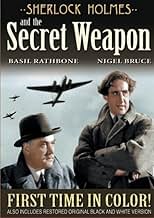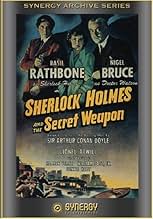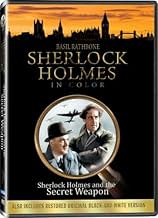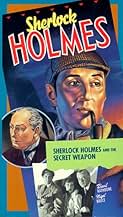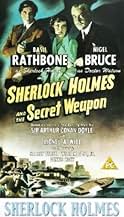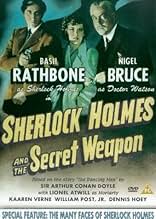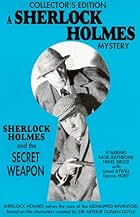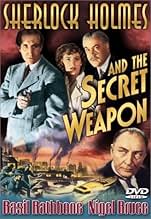Sherlock Holmes et l'Arme secrète
Original title: Sherlock Holmes and the Secret Weapon
- 1942
- Tous publics
- 1h 8m
IMDb RATING
6.5/10
7.1K
YOUR RATING
Sherlock Holmes and Doctor Watson must protect a Swiss inventor of an advanced bomb sight from falling into German hands.Sherlock Holmes and Doctor Watson must protect a Swiss inventor of an advanced bomb sight from falling into German hands.Sherlock Holmes and Doctor Watson must protect a Swiss inventor of an advanced bomb sight from falling into German hands.
Karen Verne
- Charlotte Eberli
- (as Kaaren Verne)
Rudolph Anders
- Braun
- (uncredited)
Ted Billings
- Barfly
- (uncredited)
Whit Bissell
- London Bobbie
- (uncredited)
Veda Ann Borg
- Bar Singer
- (voice)
- (uncredited)
Paul Bryar
- Swiss Waiter
- (uncredited)
John Burton
- RAF Officer
- (uncredited)
Vicki Campbell
- Woman RAF Pilot
- (uncredited)
Gerard Cavin
- Scotland Yard Man
- (uncredited)
Harry Cording
- Jack Brady
- (uncredited)
James Craven
- RAF Officer Watching Bombsight Test
- (uncredited)
Featured reviews
In the midst of WWII, Holmes is involved in the protection of a scientist working on a secret weapon that may prove to be a turning point against the Nazi's. When the scientist and his formulae goes missing, Holmes becomes involved in a rush to rescue the man and prevent nemesis Professor Moriarty getting hold of the rest of the formulae.
Although I'm not a major fan of the Holmes films where he finds himself in the modern day world, this is one of the better ones I have seen thus far. The plot is a little thick at the start but really gets going when the scientist goes missing. The investigation by Holmes is very engaging and the climax has a nice couple of scenes where Holmes and Moriarty match wits.
Rathbone makes a good Holmes as always and here he happily hasn't as bad a haircut as he did in some of the modern films. Bruce is much better than usual - he is less of a mug and is made less fun of by Holmes, he actually shows a bit of sense about him. Indeed so does Lestrade (Hoey), so often a comedy figure, it's nice to see him involved a bit more than usual! Atwill's Moriarty is good but I always saw him as a leaner, meaner man - Atwill looks more like Watson than Sherlock, even though their battle of wits is good I never felt that he was any match for Holmes, never mind being a nemesis.
Overall I enjoyed this film. It does have a small bit of propaganda at the very end but, unlike some of the other films, doesn't ram it down your throat - by making it about Moriarty rather than Nazi goons, the film works better. It has a slow start but it opens up to be very enjoyable.
Although I'm not a major fan of the Holmes films where he finds himself in the modern day world, this is one of the better ones I have seen thus far. The plot is a little thick at the start but really gets going when the scientist goes missing. The investigation by Holmes is very engaging and the climax has a nice couple of scenes where Holmes and Moriarty match wits.
Rathbone makes a good Holmes as always and here he happily hasn't as bad a haircut as he did in some of the modern films. Bruce is much better than usual - he is less of a mug and is made less fun of by Holmes, he actually shows a bit of sense about him. Indeed so does Lestrade (Hoey), so often a comedy figure, it's nice to see him involved a bit more than usual! Atwill's Moriarty is good but I always saw him as a leaner, meaner man - Atwill looks more like Watson than Sherlock, even though their battle of wits is good I never felt that he was any match for Holmes, never mind being a nemesis.
Overall I enjoyed this film. It does have a small bit of propaganda at the very end but, unlike some of the other films, doesn't ram it down your throat - by making it about Moriarty rather than Nazi goons, the film works better. It has a slow start but it opens up to be very enjoyable.
The first two Rathbone/Bruce movies were pretty good. Not just because they were in period but because their production values were good and because some effort went into the script. Only the first, "The Hound of the Baskervilles", was based on a Conan-Doyle novella. The second was a pastiche made famous on the stage by Gillette.
Then the franchise was moved to Universal Studios and a series of mostly declining quality was established. This was an early example. It's not terrible, not embarrassingly bad, it just loses something in being updated to the 1940s and in not having the atmosphere Conan-Doyle managed to inject into his characters and into the atmosphere itself. Not to mention some of Conan-Doyle's sometimes unwittingly delicious bon mots -- "The wind sobbed like a child in the chimney."
"The Secret Weapon" doesn't tell us much we don't already know about Holmes and Watson. There is a variation on Conan-Doyle's "Dancing Men" but not really much else that's too interesting. I never cared much for Lionel Atwill as an actor, and he looks especially clunky as Moriarty. Moriarty should be a reptilian ectomorph with an oscillating head.
Still, this is okay for fans of the series. Homes wears his hair combed from back to front on the sides, which is a little different. I wish the code had allowed him to do some cocaine once in a while. The best of the Universal films was unquestionably "The Scarlet Claw," so if you have to choose, choose that one to watch.
Then the franchise was moved to Universal Studios and a series of mostly declining quality was established. This was an early example. It's not terrible, not embarrassingly bad, it just loses something in being updated to the 1940s and in not having the atmosphere Conan-Doyle managed to inject into his characters and into the atmosphere itself. Not to mention some of Conan-Doyle's sometimes unwittingly delicious bon mots -- "The wind sobbed like a child in the chimney."
"The Secret Weapon" doesn't tell us much we don't already know about Holmes and Watson. There is a variation on Conan-Doyle's "Dancing Men" but not really much else that's too interesting. I never cared much for Lionel Atwill as an actor, and he looks especially clunky as Moriarty. Moriarty should be a reptilian ectomorph with an oscillating head.
Still, this is okay for fans of the series. Homes wears his hair combed from back to front on the sides, which is a little different. I wish the code had allowed him to do some cocaine once in a while. The best of the Universal films was unquestionably "The Scarlet Claw," so if you have to choose, choose that one to watch.
It was an interesting enough idea, I suppose, to set a series of Sherlock Holmes films in the "modern day"...at the time, the WWII era...but those who are familiar with the first two Rathbone/Bruce films might be thrown off by it. When the rights passed from Fox to Universal, the two stars were retained, but apparently our two heroes stepped through a hole in the space-time continuum. The Fox films were Victorian period pieces, whereas Universal took the opportunity to utilize Sherlock Holmes in the series of modern-day B-movies into which this entry falls, several of which were fairly standard wartime propaganda...pretty much the order of the day for Hollywood films circa 1942-1945.
While the film may boast some entertainment value, the plot is actually quite silly. Sherlock Holmes (sporting a remarkably bad haircut) has been charged with the task of guarding Dr. Franz Tobel, the inventor of a bomb sight (which, when you see it, will give you an idea of what the film's budget was) that will apparently revolutionize airborne warfare. Holmes's task is to keep Tobel safe (at which he fails) and to keep the bomb sight out of the hands of the Nazis. When Tobel is abducted, Holmes must unravel a coded message before his arch-nemesis, Professor Moriarty does. Though the credits state that the film is an adaptation of Conan Doyle's story, The Dancing Men, only the code itself is taken from said story. And a small reference to another story, The Empty House, also shows up early in the film. Apart from that, you'll find no Conan Doyle here.
Interestingly enough, what makes Tobel's bomb sight so remarkable, apart from the fact that the bombs seem to land where they're supposed to, is never expounded upon...leaving the viewer to assume that both Allied and German bomb sights were abysmally inaccurate, as both sides are clamoring to get their hands on one that actually works. Probably not the best way to bolster confidence in the Allied fighting machine...but then, logic is scarce in this outing. Holmes relies just as heavily upon chance and educated guesses as he does upon deduction, and it's the bumbling Watson (who was never bumbling in the original stories) who inadvertently provides the solution to the major stumbling block (despite the fact that the solution should have been obvious to someone as brilliant as Sherlock Holmes).
All in all, this film has its moments, but fails to live up to the legend of the world's greatest detective. Rathbone is a fine Holmes and Bruce (despite the almost unforgivable dumbing down of the Watson character) does a good job, as well. But much of the supporting cast seem to be phoning in their performances. The production values are rather noticeably low and the script is fairly ludicrous. I still watch this one from time to time, and certainly prefer it over Sherlock Holmes and the Voice of Terror (the first Universal Holmes entry)...but I can't help but think that Sherlock Holmes deserves better than this.
Interesting sidenote - This film contains the series' one and only reference to Sherlock Holmes's hypodermic cocaine usage. As Holmes is describing to Moriarty an elaborate hypothetical death scenario involving an intravenous needle, Moriarty interjects "The needle to the last...eh, Holmes?" How this managed to slip by the censors at the Breen Office (which, at the time, strictly forbade such references) is perhaps the one great mystery to be found in this film.
While the film may boast some entertainment value, the plot is actually quite silly. Sherlock Holmes (sporting a remarkably bad haircut) has been charged with the task of guarding Dr. Franz Tobel, the inventor of a bomb sight (which, when you see it, will give you an idea of what the film's budget was) that will apparently revolutionize airborne warfare. Holmes's task is to keep Tobel safe (at which he fails) and to keep the bomb sight out of the hands of the Nazis. When Tobel is abducted, Holmes must unravel a coded message before his arch-nemesis, Professor Moriarty does. Though the credits state that the film is an adaptation of Conan Doyle's story, The Dancing Men, only the code itself is taken from said story. And a small reference to another story, The Empty House, also shows up early in the film. Apart from that, you'll find no Conan Doyle here.
Interestingly enough, what makes Tobel's bomb sight so remarkable, apart from the fact that the bombs seem to land where they're supposed to, is never expounded upon...leaving the viewer to assume that both Allied and German bomb sights were abysmally inaccurate, as both sides are clamoring to get their hands on one that actually works. Probably not the best way to bolster confidence in the Allied fighting machine...but then, logic is scarce in this outing. Holmes relies just as heavily upon chance and educated guesses as he does upon deduction, and it's the bumbling Watson (who was never bumbling in the original stories) who inadvertently provides the solution to the major stumbling block (despite the fact that the solution should have been obvious to someone as brilliant as Sherlock Holmes).
All in all, this film has its moments, but fails to live up to the legend of the world's greatest detective. Rathbone is a fine Holmes and Bruce (despite the almost unforgivable dumbing down of the Watson character) does a good job, as well. But much of the supporting cast seem to be phoning in their performances. The production values are rather noticeably low and the script is fairly ludicrous. I still watch this one from time to time, and certainly prefer it over Sherlock Holmes and the Voice of Terror (the first Universal Holmes entry)...but I can't help but think that Sherlock Holmes deserves better than this.
Interesting sidenote - This film contains the series' one and only reference to Sherlock Holmes's hypodermic cocaine usage. As Holmes is describing to Moriarty an elaborate hypothetical death scenario involving an intravenous needle, Moriarty interjects "The needle to the last...eh, Holmes?" How this managed to slip by the censors at the Breen Office (which, at the time, strictly forbade such references) is perhaps the one great mystery to be found in this film.
In the Universal series of modern Sherlock Holmes stories with Basil Rathbone and Nigel Bruce, SHERLOCK HOLMES AND THE SECRET WEOPON is not one of the top films - although it is entertaining. I think the problem with it is that much of the film's "dueling" between Holmes and his nemesis Moriarty (here played by Lionel Atwill) seems to delay the actual point of the Professor's work.
Moriarty appears in three of the Holmes films with Rathbone. In THE ADVENTURES OF SHERLOCK HOLMES he was played by George Zucco, who gave real relish to the love of villainy for its own sake to the role. For my money Zucco's performance as the Professor was the best of the three (there is even a brief moment of comedy in his performance, when he's disguised as the "Sergeant of Police" towards the end - like he's preparing to sing "A Policeman's Lot" from Gilbert & Sullivan). Next comes Mr. Atwill's performance here - more of that later. Finally there is Henry Daniell's intellectual Moriarty in SHERLOCK HOLMES AND THE LADY IN GREEN. It's a typically cool, classy performance by Mr. Daniell, but his confrontations with Holmes seem to be a tedious bore to him. They keep him from completing the main plan. In the stories that the Professor pops up in, he really senses Holmes is a nemesis who will remain a danger as long as he is alive. Yet, because of the intellectual tennis match between him and Rathbone, Rathbone (in his autobiography) actually felt Daniell was the best of the film Moriartys.
If Zucco captured the love of evil in the Professor, and Daniell seemed to demonstrate the tired Oxford Don (in the stories the Professor is a well regarded mathematician, whose volume on the binomial theorem had a "European vogue", and who wrote an intriguing book, THE DYNAMICS OF THE ASTEROID), Atwill demonstrates the Professor as pragmatic businessman. First of all, he's sold his services (apparently) to Nazi Germany. This is never gone into, but one presumes (as this is before the Nazis began to really collapse) he figures they will win the war. Secondly, he is not a fool. When Dr. Tobel (William Post Jr.) has shown he is a state of near physical collapse due to the torturing of Moriarty's gang, the Professor decides to kidnap one of the other scientists who are assisting Tobel, because he's as good a scientist as Tobel and would be able to put together the bomb site. I somehow can't quite see Zucco making such a sensible decision on the spot, and if Daniell had to make it, he would seem annoyed that there is yet another delay to his plans.
By the way, one trick used in all the Holmes series regarding the Professor is how to rid the film of him. If you read the Holmes stories, Moriarty appears as the villain three times: in THE MEMOIRS OF SHERLOCK HOLMES' last story ("THE ADVENTURE OF THE FINAL PROBLEM"), in THE RETURN OF SHERLOCK HOLMES' first story ("THE ADVENTURE OF THE EMPTY HOUSE") and the last of the four novels/novellas (THE VALLEY OF FEAR). It's amazing how much mileage the Professor got out of so few appearances (he is mentioned in two or three other stories as well - in passing). But because of his fate at the Reichenbach Falls in "THE FINAL PROBLEM" and "THE EMPTY HOUSE", we always see him fall to his death. Zucco falls off the White Tower on Tower Hill. Daniell (with more imagination) tries to flee Gregson and the police, but is shot as he jumps, and wounded fails to hold on to the wall of an adjacent building. Atwill (here it is not seen, but heard) seems to fall down a trap door he's planted in an escape tunnel). It is really tedious after awhile to see the Professor always fall in these films. One turns to the Gene Wilder comedy (admittedly a comedy) SHERLOCK HOLMES' SMARTER BROTHER, wherein Leo McKern is a wonderfully wacky and villainous Moriarty (complete, finally, with an Irish accent), who is not killed at the end, but just left mulling - in a rowboat - over how his careful schemes did not work out. I rather liked that better.
The use of the "Dancing Men" code here, like the use of the "Devil's Foot Root" in DRESSED TO KILL, snags a part of a mystery from a short story. "THE ADVENTURE OF THE DANCING MEN" appeared in THE RETURN OF SHERLOCK HOLMES, and deals with a client of Holmes whose wife has been getting weird, blood-curdling messages in this code. Charles Higham, in his biography THE ADVENTURES OF CONAN DOYLE suggests Sir Arthur may have picked up the code from a magazine game in the 1870s, but we really don't know. The code is basically one of letter substitutions for the figures of the dancing men. The story in the short story is dramatic, but deals with a triangle. The only innovation in the film is that Tobel makes a slight change that confuses both Holmes and Moriarty.
The film will entertain, but I still think THE HOUSE OF FEAR, THE SCARLET CLAW, and SHERLOCK HOLMES FACES DEATH are better films.
Moriarty appears in three of the Holmes films with Rathbone. In THE ADVENTURES OF SHERLOCK HOLMES he was played by George Zucco, who gave real relish to the love of villainy for its own sake to the role. For my money Zucco's performance as the Professor was the best of the three (there is even a brief moment of comedy in his performance, when he's disguised as the "Sergeant of Police" towards the end - like he's preparing to sing "A Policeman's Lot" from Gilbert & Sullivan). Next comes Mr. Atwill's performance here - more of that later. Finally there is Henry Daniell's intellectual Moriarty in SHERLOCK HOLMES AND THE LADY IN GREEN. It's a typically cool, classy performance by Mr. Daniell, but his confrontations with Holmes seem to be a tedious bore to him. They keep him from completing the main plan. In the stories that the Professor pops up in, he really senses Holmes is a nemesis who will remain a danger as long as he is alive. Yet, because of the intellectual tennis match between him and Rathbone, Rathbone (in his autobiography) actually felt Daniell was the best of the film Moriartys.
If Zucco captured the love of evil in the Professor, and Daniell seemed to demonstrate the tired Oxford Don (in the stories the Professor is a well regarded mathematician, whose volume on the binomial theorem had a "European vogue", and who wrote an intriguing book, THE DYNAMICS OF THE ASTEROID), Atwill demonstrates the Professor as pragmatic businessman. First of all, he's sold his services (apparently) to Nazi Germany. This is never gone into, but one presumes (as this is before the Nazis began to really collapse) he figures they will win the war. Secondly, he is not a fool. When Dr. Tobel (William Post Jr.) has shown he is a state of near physical collapse due to the torturing of Moriarty's gang, the Professor decides to kidnap one of the other scientists who are assisting Tobel, because he's as good a scientist as Tobel and would be able to put together the bomb site. I somehow can't quite see Zucco making such a sensible decision on the spot, and if Daniell had to make it, he would seem annoyed that there is yet another delay to his plans.
By the way, one trick used in all the Holmes series regarding the Professor is how to rid the film of him. If you read the Holmes stories, Moriarty appears as the villain three times: in THE MEMOIRS OF SHERLOCK HOLMES' last story ("THE ADVENTURE OF THE FINAL PROBLEM"), in THE RETURN OF SHERLOCK HOLMES' first story ("THE ADVENTURE OF THE EMPTY HOUSE") and the last of the four novels/novellas (THE VALLEY OF FEAR). It's amazing how much mileage the Professor got out of so few appearances (he is mentioned in two or three other stories as well - in passing). But because of his fate at the Reichenbach Falls in "THE FINAL PROBLEM" and "THE EMPTY HOUSE", we always see him fall to his death. Zucco falls off the White Tower on Tower Hill. Daniell (with more imagination) tries to flee Gregson and the police, but is shot as he jumps, and wounded fails to hold on to the wall of an adjacent building. Atwill (here it is not seen, but heard) seems to fall down a trap door he's planted in an escape tunnel). It is really tedious after awhile to see the Professor always fall in these films. One turns to the Gene Wilder comedy (admittedly a comedy) SHERLOCK HOLMES' SMARTER BROTHER, wherein Leo McKern is a wonderfully wacky and villainous Moriarty (complete, finally, with an Irish accent), who is not killed at the end, but just left mulling - in a rowboat - over how his careful schemes did not work out. I rather liked that better.
The use of the "Dancing Men" code here, like the use of the "Devil's Foot Root" in DRESSED TO KILL, snags a part of a mystery from a short story. "THE ADVENTURE OF THE DANCING MEN" appeared in THE RETURN OF SHERLOCK HOLMES, and deals with a client of Holmes whose wife has been getting weird, blood-curdling messages in this code. Charles Higham, in his biography THE ADVENTURES OF CONAN DOYLE suggests Sir Arthur may have picked up the code from a magazine game in the 1870s, but we really don't know. The code is basically one of letter substitutions for the figures of the dancing men. The story in the short story is dramatic, but deals with a triangle. The only innovation in the film is that Tobel makes a slight change that confuses both Holmes and Moriarty.
The film will entertain, but I still think THE HOUSE OF FEAR, THE SCARLET CLAW, and SHERLOCK HOLMES FACES DEATH are better films.
Sherlock Holmes (Basil Rathbone) and Dr. Watson (Nigel Bruce) have been hired by the British government to protect a Swiss scientist Dr. Franz Tobel (William Post Jr.). He has a bomb that the British want to win the war. Unfortunately the evil Dr. Moriarty (Lionel Atwill) is working with the Nazis and will stop at nothing to get the doctor--and his invention.
Moving Sherlock Holmes to the 1940s sounded like a stupid idea but it does work for one reason--Basil Rathbone. Arguably he is the BEST Sherlock Holmes ever put on the screen. He plays the character so well (and accurately) that it doesn't matter what era he's solving crimes. As for Nigel Bruce as Watson...everybody has problems with it. He plays Watson as a bumbling old fool...that is NOT the Watson of the books. You seriously wonder why Holmes puts up with him. Still, he does grow on you (in a way). Then there's Atwill having a whale of a time playing Moriarty--the discussions and battle of wits between him and Holmes are just great! I've never liked Dennis Hoey as Inspector Lestrade--he's such an idiot. Makes Watson look like a genius. And Post Jr. is pretty good as Tobel (even though his accent amusingly keeps changing!).
This movie is done elaborately and runs only a little over an hour. Still, it does have it's slow spots and I never understood the secret code section.
Still, worth catching if just for Rathbone and Atwill.
Moving Sherlock Holmes to the 1940s sounded like a stupid idea but it does work for one reason--Basil Rathbone. Arguably he is the BEST Sherlock Holmes ever put on the screen. He plays the character so well (and accurately) that it doesn't matter what era he's solving crimes. As for Nigel Bruce as Watson...everybody has problems with it. He plays Watson as a bumbling old fool...that is NOT the Watson of the books. You seriously wonder why Holmes puts up with him. Still, he does grow on you (in a way). Then there's Atwill having a whale of a time playing Moriarty--the discussions and battle of wits between him and Holmes are just great! I've never liked Dennis Hoey as Inspector Lestrade--he's such an idiot. Makes Watson look like a genius. And Post Jr. is pretty good as Tobel (even though his accent amusingly keeps changing!).
This movie is done elaborately and runs only a little over an hour. Still, it does have it's slow spots and I never understood the secret code section.
Still, worth catching if just for Rathbone and Atwill.
Did you know
- TriviaThe set used for Prof. Moriarty's hideout was used as a pub/bar in Sherlock Holmes et la voix de la terreur (1942).
- GoofsWhile Holmes is in Switzerland, disguised as a book collector, he drives in a car with the steering wheel located on the right side while driving on the left side of the road. In Switzerland (and in Germany, as well, so "the Nazi's own car" would also be configured the same way), people drive cars on the right side with steering wheels mounted on the left side. The only areas of Europe where cars are right-hand-drive and occupy the left-hand lane are the British Isles and Gibraltar. A probable explanation for this apparent discrepancy is the film's overall British overtone --- the tale's primary setting is London and many of the lead actors are from England, so this is likely why British-configured cars were used.
- Quotes
Professor Moriarty: Brilliant man, Sherlock Holmes. Too bad he was honest.
- Crazy creditsOpening credits prologue: SWITZERLAND
- Alternate versionsAlso available in a computer-colorized version.
- ConnectionsEdited into Who Dunit Theater: Sherlock Holmes and the Secret Weapon (2016)
- SoundtracksRule Britannia
(1740) (uncredited)
Music by Thomas Augustine Arne
Played in the score when London is shown
- How long is Sherlock Holmes and the Secret Weapon?Powered by Alexa
Details
- Release date
- Country of origin
- Languages
- Also known as
- L'Arme secrète
- Filming locations
- Production company
- See more company credits at IMDbPro
- Runtime
- 1h 8m(68 min)
- Color
- Aspect ratio
- 1.37 : 1
Contribute to this page
Suggest an edit or add missing content


